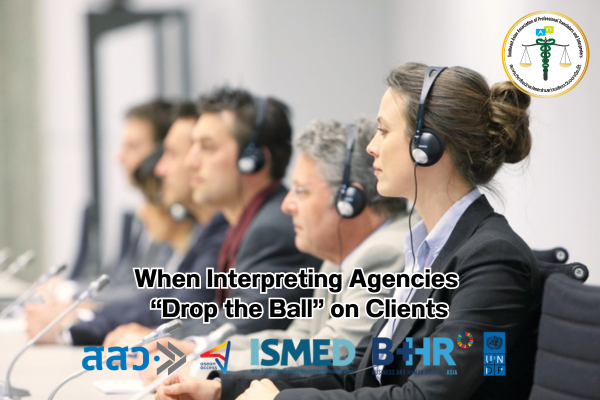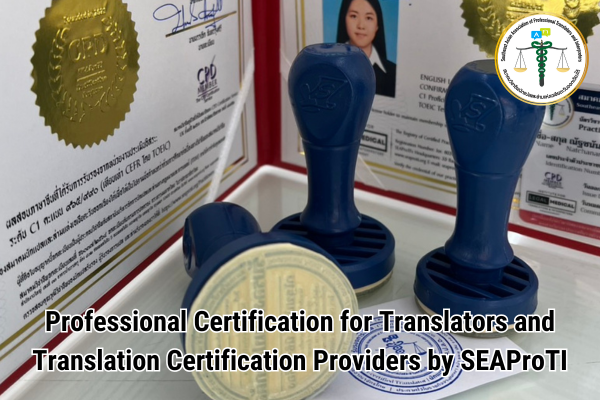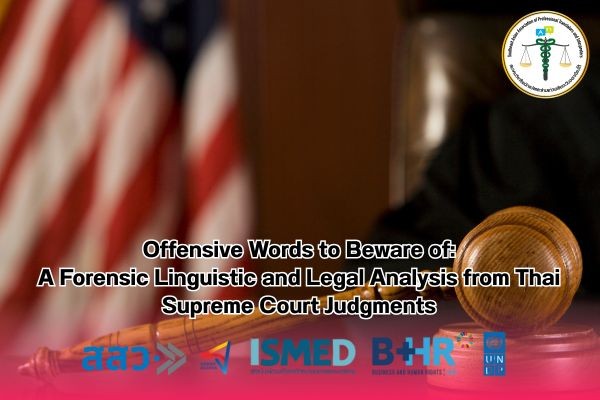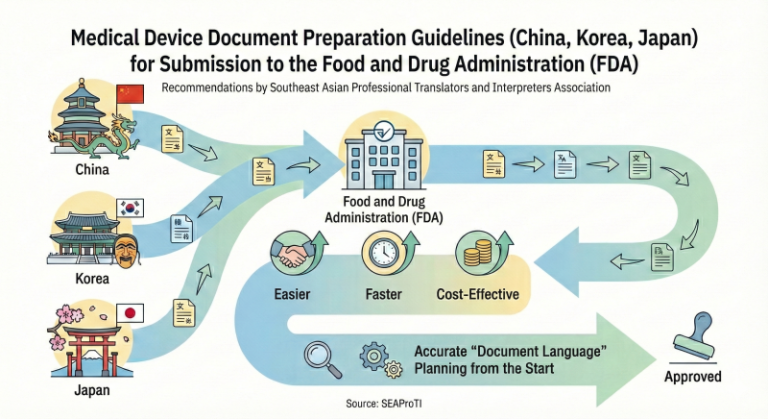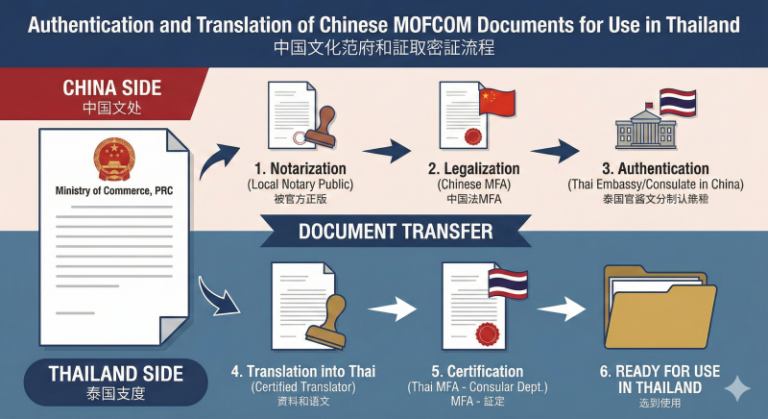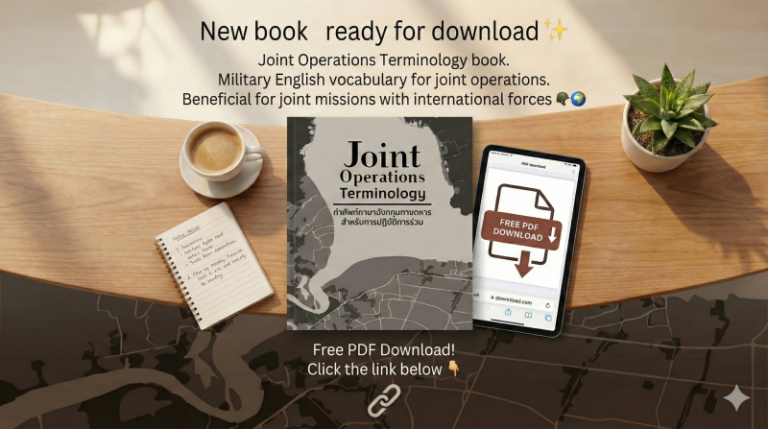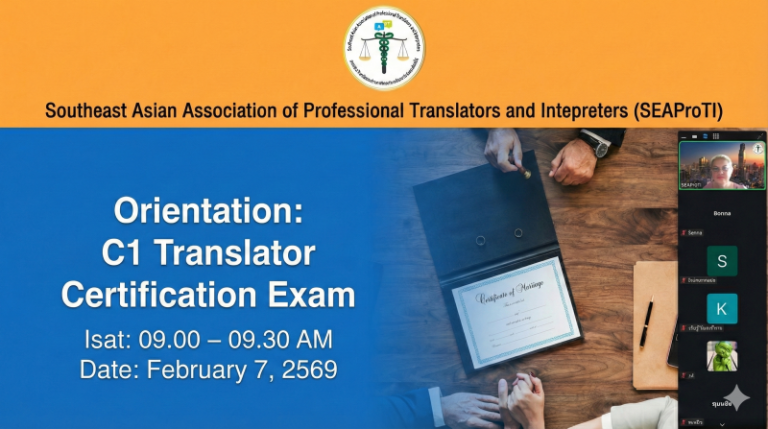When Interpreting Agencies “Drop the Ball” on Clients:
An Analysis of Causes, Impacts, and Systemic Recommendations for Preventing Service Failures
22 June 2025, Bangkok – In this article, the author analyzes cases in which interpreting service providers fail to deliver interpreters as scheduled—an occurrence colloquially referred to in the industry as “dropping the ball.” Such failures not only cause economic loss but also erode public trust in the interpreting profession. This study examines root causes, multifaceted impacts, and systemic recommendations to prevent recurrence. Emphasis is placed on professional service management and the importance of certified interpreter standards in selecting credible providers.
Interpreting services involve complex dynamics—linguistic proficiency, interpersonal communication, and human resource management. Many clients rely on agencies to recruit qualified interpreters on their behalf. However, a growing concern has emerged wherein agencies confirm an assignment but ultimately fail to provide an interpreter on the day of service. This trend reflects a systemic issue in the industry and requires thorough analysis to mitigate future occurrences.
Causes of Service Failure by Interpreting Agencies
Lack of Effective Service Management
Some agencies lack structured interpreter assignment systems and fail to prepare backup interpreters in case of emergency cancellations.
Accepting Jobs Without a Confirmed Interpreter
Certain agencies accept jobs even when they do not yet have a qualified interpreter in their network—hoping to recruit one later. If unsuccessful, they cancel the job entirely.
Absence of Binding Agreements
In many cases, there is no formal service contract or letter of agreement, resulting in weak legal accountability on the agency’s part.
Interpreter Refusal Due to Unmet Conditions
Interpreters may later decline the job due to misaligned compensation, schedule changes, or unreasonable work conditions.
Prioritization of More Lucrative Assignments
In some instances, agencies or interpreters abandon existing commitments in favor of better-paying jobs.
Impacts of Interpreting Service Failure
Business Disruption
Examples include failed negotiations, cancelled business meetings, and the inability to execute legally binding agreements.
Damage to Organizational Image
This is especially serious in high-level events involving foreign dignitaries or international stakeholders.
Legal Consequences
Failure to provide interpretation during legal proceedings may result in the loss of procedural rights or case delays.
Erosion of Trust in the Profession
Such incidents undermine client confidence in interpreters—especially in contexts where certification or professional standards are lacking.
Recommendations and Policy Proposals
Select Agencies with Recognized Certification Systems
Clients should prioritize agencies endorsed by professional bodies such as SEAProTI or those with access to a verified interpreter database.
Verify Interpreter Credentials in Advance
Clients should request CVs, certificates, or official proof of qualification before confirming a booking. Avoid agencies that cannot disclose interpreter identities in advance.
Sign Clear Contracts
Contracts should include cancellation clauses, penalty provisions, interpreter details, and contingency plans.
Exercise Caution with Upfront Payments
Avoid paying the full amount in advance. Consider installment payments or partial deposits after interpreter confirmation.
Promote Public Access to Certified Interpreter Databases
Professional bodies or regulatory agencies should develop centralized platforms for verifying interpreter qualifications and credentials.
Conclusion
When interpreting agencies “drop the ball,” it is not merely a case of isolated misconduct but a reflection of systemic flaws in service quality assurance. Raising client awareness, strengthening professional standards, and implementing transparent accountability mechanisms are key to preventing such failures in the future.
References
- Southeast Asian Association of Professional Translators and Interpreters (SEAProTI). (2024). Professional Certification Standards for Translators and Interpreters.
- Hongthong, P. (2023). Best Practices in Hiring Interpreters for Conferences and Diplomatic Events. Journal of Translation and Linguistics, 18(2), 45–59.
- Wood, B. (2021). Interpreting in the 21st Century: A Professional Guide. InterLingua Press.
- Hale, S. (2007). Community Interpreting. Palgrave Macmillan.
SEAProTI’s certified translators, translation certification providers, and certified interpreters:
The Southeast Asian Association of Professional Translators and Interpreters (SEAProTI) has officially announced the criteria and qualifications for individuals to register as “Certified Translators,” “Translation Certification Providers,” and “Certified Interpreters” under the association’s regulations. These guidelines are detailed in Sections 9 and 10 of the Royal Thai Government Gazette, issued by the Secretariat of the Cabinet under the Office of the Prime Minister of the Kingdom of Thailand, dated July 25, 2024, Volume 141, Part 66 Ng, Page 100.
To read the full publication, visit the Royal Thai Government Gazette
บริษัทให้บริการล่าม “เทงาน” ลูกค้า:
วิเคราะห์สาเหตุ ผลกระทบ และข้อเสนอแนะเชิงระบบเพื่อป้องกันความเสียหาย
22 มิถุนายน 2568, กรุงเทพมหานคร – ในบทความนี้ ผู้เขียนวิเคราะห์กรณีที่บริษัทให้บริการล่ามไม่ส่งล่ามไปปฏิบัติงานตามที่ได้ตกลงกับผู้ว่าจ้างไว้ ซึ่งมักเรียกในวงการว่า “เทงาน” สถานการณ์เช่นนี้ไม่เพียงส่งผลเสียหายทางเศรษฐกิจ หากยังบั่นทอนความไว้วางใจของลูกค้าต่อวิชาชีพล่ามโดยรวม ผู้เขียนศึกษาสาเหตุของปัญหา ผลกระทบที่เกิดขึ้นในหลายมิติ และเสนอแนวทางการป้องกันโดยอาศัยหลักการบริหารจัดการบริการวิชาชีพ พร้อมทั้งเน้นการใช้มาตรฐานการรับรองวิชาชีพล่ามในการคัดเลือกผู้ให้บริการที่น่าเชื่อถือ
การให้บริการล่ามเป็นกระบวนการที่มีความซับซ้อน ทั้งในด้านภาษาศาสตร์ จิตวิทยาการสื่อสาร และการบริหารทรัพยากรมนุษย์ ผู้ว่าจ้างจำนวนมากอาศัยบริษัทตัวแทนจัดหาล่ามเพื่ออำนวยความสะดวกในการจัดหาผู้เชี่ยวชาญด้านภาษา อย่างไรก็ตาม ปรากฏการณ์ที่บริษัทรับงานไว้แล้วกลับ “เทงาน” โดยไม่ส่งล่ามในวันงาน กำลังกลายเป็นปัญหาสำคัญในอุตสาหกรรมนี้ ซึ่งควรได้รับการศึกษาเชิงระบบเพื่อป้องกันความเสียหายในอนาคต
สาเหตุของการ “เทงาน” โดยบริษัทให้บริการล่าม
- การขาดประสิทธิภาพในการบริหารจัดการ: บางบริษัทไม่มีระบบการจัดสรรล่ามอย่างเป็นระบบ ไม่สามารถจัดเตรียมล่ามสำรองได้หากมีการถอนตัวกระทันหัน
- การรับงานโดยไม่มีล่ามในเครือข่ายจริง: บริษัทบางแห่งรับงานโดยยังไม่สามารถยืนยันตัวล่ามได้จริงในเวลานั้น หวังจะจัดหาภายหลัง ซึ่งหากจัดหาไม่ทัน ก็ยกเลิกการให้บริการ
- การขาดข้อตกลงผูกพันที่ชัดเจน: ในหลายกรณี ไม่มีการลงนามในสัญญาหรือหนังสือยืนยันการจ้างอย่างเป็นทางการ ทำให้บริษัทไม่มีข้อผูกพันทางกฎหมายมากพอที่จะรับผิดชอบ
- ล่ามปฏิเสธการทำงานเนื่องจากเงื่อนไขไม่ตรง เช่น ค่าตอบแทนไม่เป็นธรรม หรือรายละเอียดงานเปลี่ยนแปลงในนาทีสุดท้าย
- การเลือกงานที่ได้ผลตอบแทนสูงกว่า ในบางกรณี บริษัทหรือล่ามตัดสินใจละทิ้งงานเดิมเพื่อรับงานใหม่ที่มีกำไรมากกว่า
ผลกระทบที่เกิดขึ้นจากการไม่จัดส่งล่าม
- ความเสียหายทางธุรกิจ เช่น การประชุมเจรจาธุรกิจล้มเหลว การลงนามสัญญาไม่สามารถดำเนินได้ตามแผน
- ความเสียหายต่อภาพลักษณ์ขององค์กรผู้ว่าจ้าง โดยเฉพาะในงานพิธีการหรืองานที่เกี่ยวข้องกับบุคคลสำคัญจากต่างประเทศ
- ความเสียหายทางกฎหมาย หากเหตุการณ์เกิดขึ้นในการพิจารณาคดีหรือการดำเนินคดีทางกฎหมาย ผู้ใช้บริการอาจสูญเสียสิทธิบางประการ
- ความไม่ไว้วางใจต่อวิชาชีพล่าม ส่งผลต่อความเชื่อมั่นในตลาดโดยรวม โดยเฉพาะในกรณีที่ล่ามไม่มีใบรับรองหรือมาตรฐานวิชาชีพรองรับ
แนวทางการป้องกันและข้อเสนอเชิงนโยบาย
- คัดเลือกบริษัทที่มีระบบรับรองวิชาชีพ ผู้ว่าจ้างควรเลือกบริษัทที่มีการรับรองโดยองค์กรวิชาชีพ เช่น SEAProTI หรือมีฐานข้อมูลล่ามรับรองอย่างเป็นทางการ
- ตรวจสอบประวัติและใบประกอบวิชาชีพของล่ามล่วงหน้า ควรขอ CV หรือใบรับรองก่อนว่าจ้าง และหลีกเลี่ยงการทำสัญญากับบริษัทที่ไม่สามารถยืนยันชื่อผู้ล่ามล่วงหน้าได้
- ทำสัญญาอย่างชัดเจน สัญญาควรระบุเงื่อนไขเรื่องการยกเลิก การไม่ส่งล่าม การชดเชย รวมถึงการระบุชื่อผู้ล่ามให้ชัดเจน
- รักษาสัดส่วนการจ่ายค่าบริการล่วงหน้าอย่างระมัดระวัง ควรหลีกเลี่ยงการชำระเงินล่วงหน้าทั้งหมด โดยอาจแบ่งจ่ายเป็นงวดหรือจ่ายบางส่วนเมื่อได้รับการยืนยันตัวล่าม
- ส่งเสริมให้มีระบบฐานข้อมูลล่ามวิชาชีพแบบเปิดเผยต่อสาธารณะ หน่วยงานที่กำกับดูแลหรือสมาคมวิชาชีพควรพัฒนาแพลตฟอร์มกลางในการตรวจสอบคุณสมบัติล่าม
บทสรุป
การที่บริษัทให้บริการล่าม “เทงาน” ลูกค้าไม่ใช่ปัญหาเฉพาะกรณี แต่เป็นปัญหาเชิงระบบที่สะท้อนถึงความไม่มีมาตรฐานในการควบคุมคุณภาพบริการ การส่งเสริมให้ผู้ว่าจ้างมีความรู้ในการคัดเลือกผู้ให้บริการอย่างรอบคอบ การมีมาตรฐานวิชาชีพที่ตรวจสอบได้ และการสร้างกลไกความรับผิดชอบร่วมกันในระบบบริการภาษาจึงเป็นแนวทางสำคัญในการลดปัญหานี้ในระยะยาว
บรรณานุกรม
-
สมาคมวิชาชีพนักแปลและล่ามแห่งเอเชียตะวันออกเฉียงใต้ (SEAProTI). (2567). มาตรฐานการรับรองนักแปลและล่ามวิชาชีพ.
-
ปรัชญา หงษ์ทอง. (2566). แนวทางการจัดจ้างล่ามในงานประชุมและเจรจาระหว่างประเทศ. วารสารการแปลและภาษาศาสตร์, 18(2), 45–59.
-
Wood, B. (2021). Interpreting in the 21st Century: A Professional Guide. InterLingua Press.
-
Hale, S. (2007). Community Interpreting. Palgrave Macmillan.
เกี่ยวกับนักแปลรับรอง ผู้รับรองการแปล และล่ามรับรองของสมาคมวิชาชีพนักแปลและล่ามแห่งเอเชียตะวันออกเฉียงใต้
สมาคมวิชาชีพนักแปลและล่ามแห่งเอเชียตะวันออกเฉียงใต้ (SEAProTI) ได้ประกาศหลักเกณฑ์และคุณสมบัติผู้ที่ขึ้นทะเบียนเป็น “นักแปลรับรอง (Certified Translators) และผู้รับรองการแปล (Translation Certification Providers) และล่ามรับรอง (Certified Interpreters)” ของสมาคม หมวดที่ 9 และหมวดที่ 10 ในราชกิจจานุเบกษา ของสำนักเลขาธิการคณะรัฐมนตรี ในสำนักนายกรัฐมนตรี แห่งราชอาณาจักรไทย ลงวันที่ 25 ก.ค. 2567 เล่มที่ 141 ตอนที่ 66 ง หน้า 100 อ่านฉบับเต็มได้ที่: นักแปลรับรอง ผู้รับรองการแปล และล่ามรับรอง


